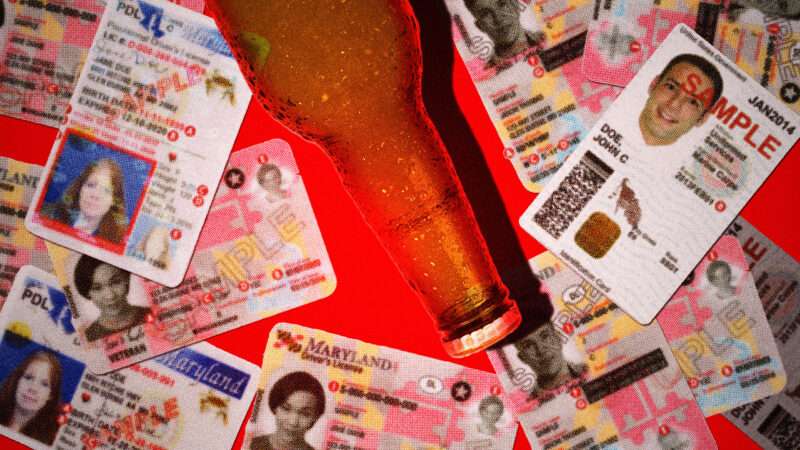
A few weeks ago, I learned the hard way just how easily government regulations can ruin a good night out.
Some friends and I had decided to drive an hour or so outside D.C. to visit Annapolis, Maryland. We were eager to go barhopping but quickly ran into trouble: Being over 21 and having valid identification to prove it wouldn't be enough to actually get us alcohol.
As it turned out, a few of us—me included, unfortunately—had vertical driver's licenses. After sitting down at a local restaurant, our waiter told us this meant he couldn't serve us. He insisted that Maryland law barred serving alcohol to anyone who tries to buy it with a vertical ID.
"He was very adamant about Maryland only accepting vertical IDs, despite my previous experience to the contrary," said Jack Bailey, a friend of mine who was there that night. "I've been to plenty of restaurants in Maryland where I've been allowed to purchase alcohol."
We eventually found a restaurant that was willing to serve us, vertical IDs and all, but the incident struck me as strange. Based on some quick internet searching, the experience was far from unique. In Maryland, it's not uncommon for restaurants and bars to refuse service to vertical ID holders, and the online consensus is that Maryland law requires this restriction.
But the real reason behind this practice turns out to be a complicated mess of local rules, state laws, and overzealous regulators.
Most states give vertical licenses to drivers under 21, presumably to make it easier for bartenders to weed out underage drinkers. In some states—like Maryland—vertical licenses are set to expire soon after the user turns 21, to make this difference even clearer. However, in many states—including Florida and Alabama, where Jack and I are from—vertical licenses can remain in use for much longer. Mine is good until just a few months shy of my 24th birthday. Jack's is valid until he's 24.
However, despite the insistence of online commenters—and our server—there's no Maryland law barring the use of vertical IDs in alcohol purchases. Maryland law "really doesn't mention anything about what orientation the driver's license has to have," Jeffrey Kelly, the executive director of the Maryland Alcohol and Tobacco Commission told me. "It doesn't make any comment to that. It's just the obligation of the individual seller to be certain that the person they're selling to is 21 or older."
Importantly, Maryland does have some other restrictive ID regulations. In Maryland, alcohol sellers are only technically allowed to accept Maryland driver's licenses or ID cards, a military ID, or a state-issued electronic driver's license. This particular regulation seems unusual, as all of Maryland's five neighbors (Delaware, Virginia, Pennsylvania, West Virginia, D.C.) allow businesses to officially accept any U.S. driver's license.
This means that businesses must exercise extra caution when examining out-of-state IDs. "If it's an out-of-state ID, that doesn't mean they can't purchase alcohol. It just might require another level, I guess, evaluation by the seller," Kelly said. If the customer does not obviously look older than 21, a business can ask for a second form of identification, or ask the customer to sign a form swearing that they are over 21.
This seems to be part of why vertical ID holders get turned away so often in Maryland—it's just easier than using one of the other methods of verifying the age of out-of-state customers. Rather than turning away everyone not from Maryland, turning away the minority of early 20-somethings with leftover vertical IDs helps businesses lower their risk of losing their license over an accidental sale of alcohol to a minor without busting out a load of paperwork.
However, this isn't the full reason behind Maryland bars' tendency to turn away vertical ID holders. Local regulations and recommendations can get in the way, too. "Maryland has a different way of approaching the retail sales of alcohol, different than most every other state in the country, and that is each local jurisdiction…[has] their own local liquor boards," Kelly said, "So each of these local boards has its own set of regulations that apply to the retailers, and each jurisdiction has some type of unique legislation surrounding [sic] as well."
For example, the local government of Frederick County Maryland has a suggested "Responsible Sales Policy" that, among other restrictions, recommends that business mandate that "no employee will accept a vertical identification card."
These factors—Maryland's narrow range of officially acceptable IDs and stringent local regulations and "suggestions"—end up incentivizing business owners to turn away droves of legal, paying customers. Making matters worse, many of them seem to think they're following state law when pushing out vertical ID holders.
My friends and I will probably stick to barhopping in D.C. instead.
The post Why Won't Maryland Sell Me a Goddamn Beer? appeared first on Reason.com.







